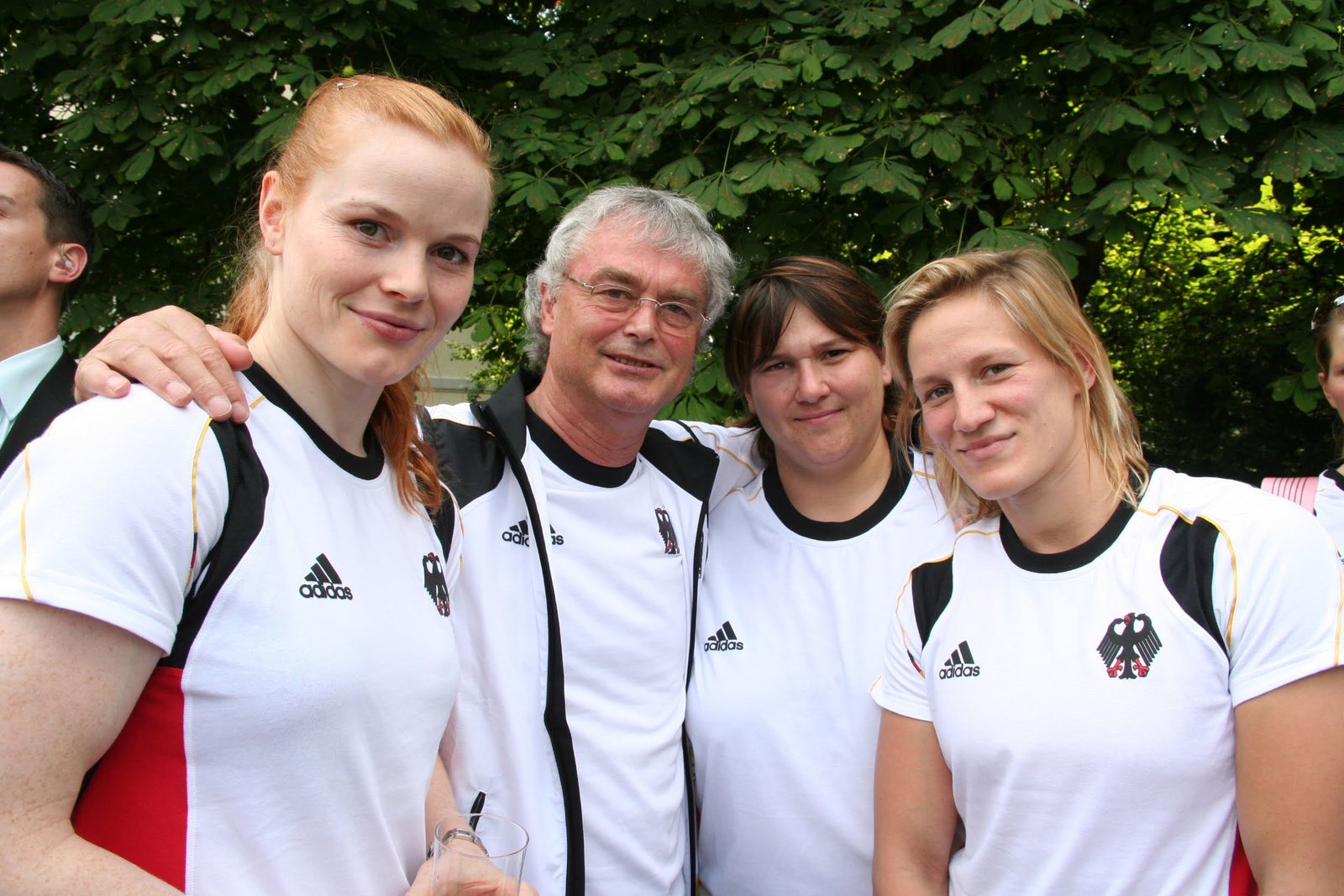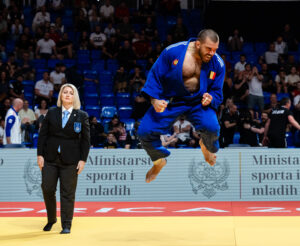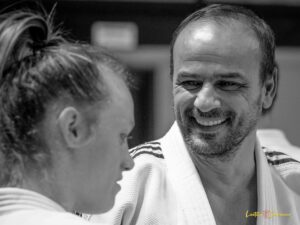Born on 26 July 1944 in Ulrichshorst (Germany), Norbert Littkopf passed away on 25 October 2024 at the age of 80. Having taken up judo at the age of 17, ‘Nobsch’ made his mark as coach of the reunited German women’s team from 1990 to 2008, both through his results and his personality. Over this period, according to journalist Birgit Arendt, quoted by the JudoInside website, he and his athletes won a total of 19 titles, 15 silver medals and 48 bronze medals in major championships (Olympic Games, World championships, European championships). These 82 high-altitude podium finishes place the man who was named European Coach of the Year in 2003 and 2004 on a par with two other World judo legends who have recently passed away: Cuban Ronaldo Veitía Valdivié (1947-2022) and Dutchman Chris de Korte (1938-2024)… Since a teacher can often be recognized by the way his pupils talk about him, we reread the words dedicated to him by former U57kg Yvonne Snir-Bönisch – whom he led to the Olympic title in Athens in the middle of three consecutive World finals between 2003 and 2005 against the same opponent, North Korea’s Kye Sun-hui – when she left her position as assistant coach of the Israeli women team to take over the Austrian team. And we asked her former teammate Annett Böhm (see JudoAKD#008), who was the first to alert us to the void left by the death of her mentor, to pay here the tribute that Norbert Littkopf deserved. – JudoAKD#027
A French version of this article is available here.

First time. “I got to know Norbert Littkopf when I was about 15/16 years old. I came to Leipzig in 1995, where he lived. He was often on the judo mat when we did randori together. I was still in the juniors at the time but I was already being invited to women’s competitions and training camps. To be honest, I didn’t know him before that time. I was impressed by the strong women’s team and all the personalities there, especially Norbert Littkopf. He never pushed himself to the front, but shaped his team to be strong and self-confident. I found that incredibly impressive. Although I was only 16 years old, he treated me with respect. I have learnt what it means to reach the top of the world. To train hard, stay down to earth and never be arrogant. »
Judoka and musician. “It was typical for Norbert to always have his guitar, accordion and mouth harmonica in the car every time he travelled to a competition or training camp – it was his routine to always have it in the car. Because whenever an opportunity presented itself, he pulled it out and created a fantastic atmosphere, nationally and internationally. In this he was unique. He knew how to bring people together. How to make a team even better on the mat, even stronger. At national training camps, where we prepared for the Olympics, World Championships or European Championships, there was always a team evening. All the athletes in a weight class had to prepare and present a show act. Each time, Norbert got out his guitar, accordion, kazoo or mouth harp and created a great atmosphere in the team. Those were unforgettable evenings. If he found a piano in the hotel during a competition, it was Norbert who would sit and play it after the competition. That’s how he connected international judoka – we all sat round it. We often experienced this in Japan at the women’s tournament in Fukuoka, for example.
I will never forget his last song which was instrumental, on the harmonica before everyone knew the evening was over: « Time to say good bye« .”

Three moments. “The first moment was when he became national coach in 1990. That was before I had the chance to get to know him. He had brought the East and West German women’s teams together, against all odds. It wasn’t easy, but he managed it. The fact that he was able to do this earned him my admiration.
The second moment was when we had a difference of opinion about a detail during training. It was shortly before a tournament in Moscow. In the end, I had won gold. We hugged each other and said: ‘Gold is fantastic, but you don’t need this kind of preparation everytime you clash.’
The third moment was undoubtedly the most emotional: winning the bronze medal in Athens. I hugged him after my bronze medal match. This success brought us closer together, even more so than before. We had achieved what we had been working towards for years.”
Last years, last days. “When Norbert Littkopf ended his career as national women’s coach after the 2008 Olympics, I also ended my competitive sports career. Since then, a new kind of relationship began. As he lived in Schkeuditz near Leipzig, I visited him regularly as well as my former teammates Sandra and Katja. Whether it was a barbecue, coffee and cake – we always brought out the old stories and laughed heartily about them. We always stayed in close contact. We all shared our new lives – after competitive sport. Family, children, holidays, new challenges – all that.
During this time, however, we also witnessed Norbert Littkopf’s health getting worse and worse. We were allowed to be with him until the end. The day before he died, Sandra and I were still with him. We were very grateful for that. We said goodbye – thanked him for all he did for us.
We will never forget him. Norbert Littkopf was unique: particularly strict and focussed on the judo mat, but always fair, loving and warm. He had character and a role model function. In all aspects of life, he was and will remain an example to follow.” – Interview by Anthony Diao, autumn 2024. Opening picture: ©©Archives Annett Boehm/JudoAKD
A French version of this article is available here.

More articles in English:
- JudoAKD#001 – Loïc Pietri – Pardon His French
- JudoAKD#002 – Emmanuelle Payet – This Island Within Herself
- JudoAKD#003 – Laure-Cathy Valente – Lyon, Third Generation
- JudoAKD#004 – Back to Celje
- JudoAKD#005 – Kevin Cao – Where Silences Have the Floor
- JudoAKD#006 – Frédéric Lecanu – Voice on Way
- JudoAKD#008 – Annett Böhm – Life is Lives
- JudoAKD#009 – Abderahmane Diao – Infinity of Destinies
- JudoAKD#010 – Paco Lozano – Eye of the Fighters
- JudoAKD#011 – Hans Van Essen – Mister JudoInside
- JudoAKD#021 – Benjamin Axus – Still Standing
- JudoAKD#022 – Romain Valadier-Picard – The Fire Next Time
- JudoAKD#023 – Andreea Chitu – She Remembers
- JudoAKD#024 – Malin Wilson – Come. See. Conquer.
- JudoAKD#025 – Antoine Valois-Fortier – The Constant Gardener
- JudoAKD#026 – Amandine Buchard – Status and Liberty
- JudoAKD#028 – Raffaele Toniolo – Bardonecchia, with Family
- JudoAKD#029 – Riner, Krpalek, Tasoev – More than Three Men
- JudoAKD#030 – Christa Deguchi and Kyle Reyes – A Thin Red and White Line
- JudoAKD#031 – Jimmy Pedro – United State of Mind
- JudoAKD#032 – Christophe Massina – Twenty Years Later
- JudoAKD#033 – Teddy Riner/Valentin Houinato – Two Dojos, Two Moods
- JudoAKD#034 – Anne-Fatoumata M’Baïro – Of Time and a Lifetime
- JudoAKD#035 – Nigel Donohue – « Your Time is Your Greatest Asset »
- JudoAKD#036 – Ahcène Goudjil – In the Beginning was Teaching
- JudoAKD#037 – Toma Nikiforov – The Kalashnikiforov Years
Also in English:
- JudoAKDReplay#001 – Pawel Nastula – The Leftover (2017)
- JudoAKDReplay#002 – Gévrise Emane – Turn Lead into Bronze (2020)
- JudoAKDReplay#003 – Lukas Krpalek – The Best Years of a Life (2019)
- JudoAKDReplay#004 – How Did Ezio Become Gamba? (2015)
- JudoAKDReplay#005 – What’s up… Dimitri Dragin? (2016)
- JudoAKDReplay#006 – Travis Stevens – « People forget about medals, only fighters remain » (2016)
- JudoAKDReplay#007 – Sit and Talk with Tina Trstenjak and Clarisse Agbégnénou (2017)
JudoAKD – Instagram – X (Twitter).



